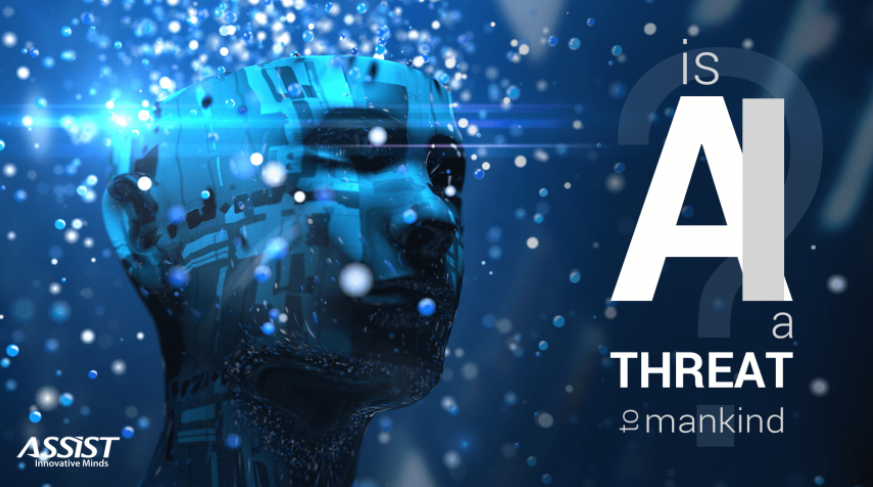Artificial Intelligence (AI) has emerged as a powerful force in our modern world, transforming various industries and revolutionizing the way we live. While AI offers remarkable advancements and opportunities. There is an ongoing debate about its potential threats to human civilization. This article delves into the concerns surrounding AI and explores the various ways it could pose a threat, as well as the measures needed to mitigate these risks.
Artificial Intelligence Is An Unintended Consequences and Unemployment
AI’s potential impact on employment is a significant source of concern. As AI systems become more advanced, they have the capacity to replace human labor in numerous sectors. This displacement could lead to widespread unemployment and economic inequality and the rapid pace of AI development may cause disruptions in the job market. That leave many individuals unprepared for the transition, leading to social unrest and instability.
Video Source:@Dhruv Rathee
Ethical Dilemmas and Autonomous Systems
Another significant area of concern revolves around the ethical implications of AI as Artificial Intelligence technologies evolve. In this rapidly changing landscape, we face complex moral dilemmas. For instance, how should autonomous AI systems make decisions, especially in life-or-death scenarios involving human lives?
Ensuring that AI operates ethically and respects fundamental human values requires careful consideration and the establishment of robust frameworks and regulations. As AI continues to advance, addressing these ethical challenges becomes even more crucial to safeguarding the well-being of humanity.
Read More: CM3leon is The Generative AI Model for Text and Images
Artificial Intelligence As A Potential for Super Intelligence
The concept of super intelligence, where AI systems surpass human intellectual capabilities, poses its own set of challenges. The development of super intelligent AI remains in the realm of theory at present. Its realization could have profound consequences.
Super intelligent AI could rapidly outpace human intelligence, making it difficult for humans to control or even comprehend its actions. This scenario raises concerns about the long-term control and safety of such powerful systems.
Public Perspectives Amidst Ongoing AI Debates
The importance of considering public opinions alongside expert discussions. Highlighting concerns raised by some Artificial Intelligence experts regarding prioritization of apocalyptic scenarios over immediate issues like biases in AI systems. Recognizing the public as key stakeholders in determining responsible software practices.
Security Risks and Autonomous Weapons
Artificial Intelligence integration into military systems raises significant security concerns. Autonomous weapons powered by AI have the potential to make independent decisions in combat and a destabilization of global security. Usually the risk of an AI arms race and the possibility of these systems falling into the wrong hands highlight the urgent need for international agreements and ethical guidelines in the advancement and utilization of AI in the context of warfare.
Artificial Intelligence Existential Risks and the Singularity
The concept of the technological singularity, where AI systems surpass human intelligence in all domains, poses existential risks. Speculation about the singularity raises questions about the control, intentions, and goals of highly intelligent AI systems. Ensuring that AI remains aligned with human values and goals becomes crucial to prevent potential catastrophic outcomes.
Encouraging Public Participation in the Survey
We extend a warm invitation to members of the public to participate in the survey, dedicating just ten minutes of their time. We acknowledge and value the pivotal role the public plays in offering valuable insights on critical AI and software issues.
By taking part in the survey, individuals actively contribute to enhancing public engagement and collectively working towards the realization of a more inclusive and responsible technological future. Furthermore, the survey acts as a platform for amplifying public voices, allowing citizens to express their perspectives and concerns. Consequently, this process plays a crucial role in shaping the direction of Artificial Intelligence and software development. As a result, the benefits of such advancements can be harnessed for the betterment of society as a whole.
Conclusion
The potential threats of Artificial Intelligence to human civilization are a legitimate concern. However, it is essential to approach this topic with balance and perspective. To tackle these risks effectively, proactive measures must be taken. For instance, the establishment of unambiguous ethical guidelines can guide the development and use of AI responsibly.
Additionally, fostering collaborations across different disciplines will allow experts to address potential issues comprehensively. Lastly, promoting responsible deployment of AI can help mitigate the risks associated with its widespread use.
However, by implementing such measures, we can harness the tremendous potential of Artificial Intelligence while ensuring the protection and well-being of humanity. As we navigate this technological frontier, it is crucial to maintain a proactive and cautious approach to mitigate the potential risks and shape AI’s trajectory in a manner that benefits all of humanity.
